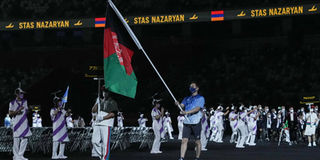Tokyo titbits: Afghans are loved

The flag of Afghanistan is carried out at the opening ceremony for the Tokyo 2020 Paralympic Games at the Olympic Stadium in Tokyo on August 24, 2021. PHOTO/AFP
What you need to know:
- Everyone stood up to clap for the flag, a preserve for only nations that make it here. But it was decided that the flag would be represented in Japan as ‘an act of solidarity and peace’ . The flag was carried by a Tokyo 2020 volunteer.
So, Afghans fleeing the Taliban arrived in the safe haven of Uganda yesterday morning. None is here in Tokyo but there was no lack of emotion as the Afghanistan flag was carried into the opening ceremony on Tuesday.
Two athletes had been due to compete for Afghanistan at the Paralympics, before their National Paralympic Committee withdrew from the Games, due to flights being cancelled out of the capital, Kabul.
Everyone stood up to clap for the flag, a preserve for only nations that make it here. But it was decided that the flag would be represented in Japan as ‘an act of solidarity and peace’ . The flag was carried by a Tokyo 2020 volunteer.
Now full house
It’s taken for Uganda to get its entire contingent to Tokyo. The first batch including two athletes, sprinter Peace Oroma and para-swimmer Husna Kukundakwe, left Entebbe last Tuesday and got here on Thursday. Then, on Monday, Uganda’s biggest para-athlete David Emong arrived after a 45-hour journey.
Then yesterday, Rita Asiimwe touched down at Narita International Airport having left home on Monday. With four athletes, this is Uganda’s biggest contingent since her Games’ debut in 1972. There, Uganda’s team had two males in the field events of javelin and shot put.
Need for Google
Whenever you travel to a country where the language most of us know, English, is not the first language, it’s inevitable to note down locations you plan to go to on a piece of paper. We also make use of Google Maps. But, we are also tempted to ask strangers for directions.
If those strangers are Japanese who are extremely nice and helpful, you find yourself requesting directions as part of the routine. Interestingly, every Japanese person you stop to ask will immediately pull out their iPhone and log into Google Maps to find your intended location. Does anyone know this place at heart? Is it even necessary in a country that’s well-mapped by the global search engine?
COMPILED BY ISMAIL DHAKABA KIGONGO




